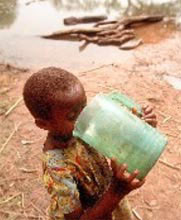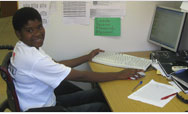
Photo: World Vision
A Mauritanian child enjoying a drink of clean water.
Thanks to new clean water cisterns, residents of the capital city of Nouakchott no longer worry about their water supply.
|
Initiative
USAID's Mauritania Antipoverty Program provided a $1.8 million five-year grant for new clean water cisterns to help poor residents living in Nouakchott, the capital city. World Vision built forty-two water storage cisterns around the city from funding provided through commodity monetization of USAID's Food For Peace Title II commodities. Monetization is the sale of donated U.S. commodities in a foreign country to generate funds for development activities. The communities of Nouakchott contributed approximately 10% of the total cost of the cisterns and appointed committees to manage and maintain the cisterns. Elmedina El Mauna Warra is a group in the Elmina zone that benefited from the first water cistern in the area. In order to raise the finances necessary for the community contribution, the group coordinated efforts of fourteen cooperatives from the zone, which suffers from a continuous shortage of water.
|


